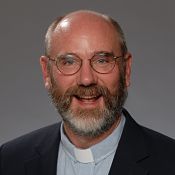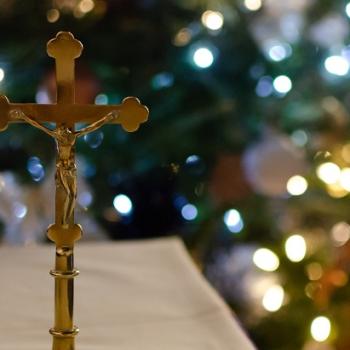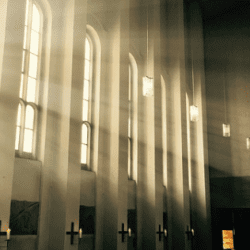by Peter Leithart
Human beings are temporal creatures, but our experience of time isn’t merely of the relentless tick-tock of clock time. Time has quality as well as duration. We can spend an hour waiting for a late bus, or we can spend an hour absorbed in a book or a lively conversation. By the clock, it’s the same time, but our experience is very different. Our experience of duration is very different.
Time is always socially shaped. The present isn’t the knife-edge between the vanishing past and the not-existing future. We make present times by our activities, alone or with one another. There is the present time of the classroom, formed by teacher and students. There’s dinnertime made by a family gathered at a table. There’s the time of the game or the time of the project or the time of the movie. Our time is always articulated.
We organize our lives by organizing our times. We schedule our days for waking, preparing, eating, working, relaxing, talking, sleeping. We orchestrate our weeks in a rhythm of work and leisure. We compose our years with holidays, anniversaries, birthdays, vacations.
And we do this collectively. Every society has a liturgical calendar. Every people punctuates time, italicizing this moment and underlining that. In the U.S., we have national holidays like the Fourth of July and Thanksgiving. Nearly every American celebrates Christmas, even if they are not Christians. Other countries have other holidays, and organize their year differently.
Holidays are moments for collective memory, for memorializing our heroes, for remembering our common past and for recommitting ourselves to what makes us the people we are, so that we lean toward to a common future.
The choice is never between having an annual pattern to our time or not. The question is which pattern we will adopt.
Many modern Christians live by the calendar of their culture, rather than following a distinctively Christian calendar. In some American churches, the fourth of July is a bigger celebration than Easter. We should wonder: Is that an accommodation to the world? Are we more American than Christian?
More deeply, many Christians have accepted the flattening of time characteristic of modernity. If we acknowledge that we organize our time, we still believe that real time is the mechanical movement of the clock. Diverting as they are, our holidays and festivals and celebrations are wispy fantasies, epiphenomena dancing along the hard surface of time itself. We should ask: Is this too an accommodation to the world?
And we should wonder: Should a Christian arrangement of time be stamped with Christ?
The church has long answered Yes to that question. Her predecessor, Israel, had a liturgical calendar that commemorated Passover, Sinai, the wilderness wandering, the deliverance from Haman, the dedication of the second temple.
Based on Israel’s model, the early church early on developed a liturgical calendar organized around the life of Jesus. The traditional church year begins in Advent, with the coming of Jesus. Christmas celebrates His birth, and Epiphany recalls the manifestation of Jesus’ glory to the Magi, at His baptism, on the mount of transfiguration.
With Lent, we enter the sufferings of Jesus. For forty days, Christians meditate on the cost of our salvation, giving thanks that God Himself paid the price. Holy week commemorates the death and burial of Jesus, and ends with the lightning bolt of Easter, Jesus’ triumph over death. Ascension celebrates Jesus’ enthronement at the right hand of his father, and at Pentecost we give thanks for the coronation gift of the Spirit.
Between Advent and Pentecost, we move from the Father who sends the Son to the Spirit to takes us to the Father. And so Pentecost is followed by the long season of Trinity, during which the church is called to meditate on the God revealed in the life history of the Word made flesh.
The church calendar has enormous pastoral value. It keeps our focus where it should be – on Jesus. A church that keeps the church calendar and follows a lectionary cycle of seasonal readings will run through the gospel story each year, and the gospel story will set the pattern for our times. By following a church calendar, the church redeems time, claims it for Jesus. The church calendar inoculates us against conformity with the world by articulating our time Christianly.
We will have made progress toward evangelizing time when we develop the habit of saying “Happy New Year” not on January 1, but on the First Sunday of Advent.

Peter Leithart is President of the Theopolis Institute in Birmingham, Alabama. To learn more about Theopolis, sign up for the e-newsletter In Medias Res.














